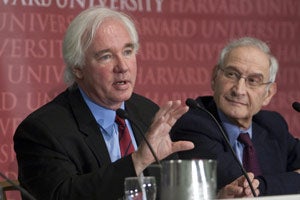The resilience of the U.S. Constitution, the nation’s founding document, was put to the test Sept. 17 by a number of scholars who challenged its legacy and effectiveness.
In honor of Constitution Day, the annual celebration that commemorates the signing of the historic document on Sept. 17, 1787, a group of Harvard constitutional experts met in Emerson Hall to explore why the landmark text should be celebrated and criticized. (Watch a webcast.)
The event was followed by a discussion between retired U.S. Supreme Court Associate Justice David Souter and Harvard Law School’s Noah Feldman, Bemis Professor of Law.
Though the criticisms were in greater supply, there were also compliments for the text from the five-member panel.
Charles Fried, Beneficial Professor of Law, said the document’s brevity is one of its most impressive features.
Its small size was to be admired, said Fried, who noted that educated and literate statesmen “schooled in the sense of style” were responsible for its crisp language.
“It’s [this] very concision that is its great rhetorical sense,” said Fried.
With less than 5,000 words used to define the country’s system of laws, division of power into three separate branches, and citizen’s rights, it is one of the world’s shortest constitutions.
But Fried also noted that structural issues, like the separation of powers and the bicameral nature of the legislature, make it “very difficult for the government that [the Constitution] established to actually do anything.”
Many lauded the goals spelled out in the work’s preamble. The concepts of justice, liberty, and domestic tranquility are “political ideals that are worthy of continued adherence,” said Mark Tushnet, William Nelson Cromwell Professor of Law.
But the fact that the document condoned slavery and created a nation of slave owners was a critical flaw, agreed the panelists.
“Framers had to do so if they wanted the participation and agreement of the Southern states,” acknowledged Michael Klarman, Kirkland & Ellis Professor of Law. “Still it’s hard to celebrate a document that protected slavery for 20 years.”
Another failing, many noted, is the Constitution’s creation of the electoral college — the system that allows popularly elected electors from each state to in turn officially vote for the president of the United States.
The section of the document that deals with elections and voting rights was “very badly crafted,” said Alex Keyssar, Matthew W. Stirling Jr. Professor of History and Social Policy at Harvard’s John F. Kennedy School of Government.
“[It] does not provide for a popular election for president,” said Keyssar. “That has created problems and still continues to do so. … Both Richard Nixon and Bill Clinton got the keys to the Oval Office by getting 43 percent of the [popular] vote. This is nowhere near majority approval.”
Tushnet called the Constitution’s Article V, which is an amendment clause, its most “anti-democratic feature,” noting that the article makes it “functionally impossible to amend the Constitution with regard to anything of significance.”
Nancy Rosenblum, chair of Harvard’s Department of Government and the Senator Joseph S. Clark Professor of Ethics in Politics and Government, helped coordinate the program in collaboration with the University’s Office of the Provost. She also moderated the event.
The Harvard event is in keeping with a 2004 law that mandates all educational institutions receiving federal funding to hold an educational program relating to the U.S. Constitution.
Sanford Levinson, professor of government at the University of Texas Law School, also took part in the panel.
